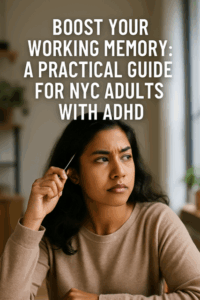Boost Your Working Memory: A Practical Guide for NYC Adults with ADHD
Guest Author: Craig Selinger, M.S., CCC-SLP
I. Introduction: The Working Memory Dilemma for Adults with ADHD
Do you often misplace your MetroCard, lose track of conversations, or forget what you walked into a room to do? If you’re an adult with ADHD, especially in the fast-paced environment of New York City, these challenges can feel constant and exhausting.
These everyday frustrations often stem from difficulties with working memory.
What is Working Memory (and Why Adults with ADHD Struggle With It)?
Many adults search for answers by asking what is working memory. In simple terms:
- Short-term memory is like a storage bin. It temporarily holds a small amount of information for a few seconds, like remembering a phone number just long enough to dial it.
- Working memory is your brain’s mental whiteboard. It not only stores information but lets you use it at the same time—for example, remembering a phone number while comparing it to another or writing it down.
Research over the past decade confirms that working memory difficulties persist into adulthood for people with ADHD, directly impacting executive functioning skills like organization, planning, and time management (Frontiers in Psychiatry, Nature).
Fun fact: I began my career studying working memory in a psychology lab and co-authored peer-reviewed research on it (PubMed). That background continues to shape my ADHD and executive function coaching work today.
II. Understanding Your Focus: The 4 Types of Attention
Managing working memory isn’t only about writing things down—it’s also about how we focus. The Themba Tutors infographic on the four types of attention explains how different types of focus shape our ability to learn, work, and remember:
- Sustained Focus – staying with a task over time.
- Selective Focus – tuning out distractions and locking onto one thing.
- Alternating (Divided) Focus – switching between multiple tasks or inputs.
- Hyperfocus – giving intense attention to one task, often losing track of time.
Practical Tips for NYC Adults with ADHD
- Prioritize Sleep: Adequate sleep is one of the most powerful ways to improve working memory and support all four types of attention.
- Reduce Distractions: Every ping, notification, or visual clutter pulls your brain toward alternating focus—at the cost of sustained and selective focus. A clear desk, silenced phone, or noise-canceling headphones help you increase working memory capacity.
- Be Aware of Transitions: Switching tasks can be especially draining. Transitions interfere with sustained and selective focus while placing heavier demands on alternating focus. Build small “reset rituals” (like jotting a quick note before moving on) to minimize disruption.
- Leverage Hyperfocus: Although not part of the ADHD diagnosis itself, hyperfocus is commonly reported by adults with ADHD. When directed well, it can be a superpower for deep work. Plan to use it during quieter times (early mornings, late evenings). Support healthy hyperfocus by removing distractions and creating a calming work environment.
III. Your DIY Working Memory Toolkit
5 Practical Working Memory Strategies You Can Use Today
These are not games or gimmicks—they’re practical working memory strategies and activities for working memory that can make daily life easier.
- Write It Down (Always)
Many adults with ADHD also struggle with poor handwriting. That’s okay—your notes don’t need to be pretty or long. Even messy handwriting strengthens recall more than typing. Just make sure your notes are readable to you. Notes can be as simple as:- One word (“deadline”)
- A phrase (“call landlord 3pm”)
- An acronym (“MARE” for Milk, Apples, Rice, Eggs)
The key is consistency. Having a simple, predictable system reduces the mental load. Learn more in How Writing Improves Memory.
- Prepare for Working Memory Demands
Anticipate moments when memory will be taxed—like meetings, phone calls, or errands. Write down:- Key concepts
- Important numbers or figures
- Names or deadlines you may need to recall quickly
This preparation lowers the chance of forgetting under pressure.
- Create Visual Cue Systems
Visual cues aren’t about scattering Post-its everywhere—they’re about sequencing and predictability. For example:- Bathroom: toothbrush, face wash, deodorant, lotion—set up in the order you’ll use them.
- Entryway: a tray or hook where you always put your keys and wallet.
- Kitchen: prep snacks or lunches the night before.
When everything has a place, the visual reminds you automatically. Low cognitive load = fewer mistakes. See more Working Memory Strategies.
- Build Simple Routines
Automating repetitive tasks saves memory power. Lay out clothes, snacks, or work bags the night before. Consistent routines remove decision-making from busy mornings. - Reduce Clutter, Increase Clarity
A clear workspace lowers visual competition, making reminders stand out. Less clutter means less cognitive load—and less stress.
III-B. Lifestyle & Self-Care Supports for Working Memory
Working memory isn’t only shaped by tools and systems—it’s also influenced by your overall health and lifestyle.
- Self-Care Basics: Getting enough sleep, maintaining a balanced diet, and managing stress are crucial for all cognitive functions, including working memory.
- Avoid Multitasking: Multitasking drains working memory capacity. Focus on one task at a time—close unnecessary tabs, silence notifications, and clear your workspace. Each distraction forces your brain into alternating focus instead of sustained focus.
- Mindfulness & Exercise: Yoga, meditation, or a walk in Central Park can reduce stress and improve brain function. Exercise has been shown to boost both mood and working memory.
- Externalize Information: Don’t rely on your brain to hold everything. Use planners, whiteboards, or digital tools. For those building new habits, try the free Atoms App by James Clear, which helps track and reinforce behavior change.
IV. Mnemonic Strategies for Adults with ADHD
Mnemonics are structured memory skills that help you encode and retrieve information more effectively. If you’ve ever wondered what is a mnemonic, it’s simply a memory technique—like acronyms, rhymes, or the storytelling method.
- Keyword Mnemonics – Example: Need to remember your subway stop at York Street? Picture Yoda standing at the entrance. (Acronyms & Acrostics)
- Chunking Information – Instead of remembering F → 6 → Q trains, think of it as a downtown-to-midtown-to-uptown sequence.
- Acronyms & Acrostics – Example: To recall Bread, Eggs, Apples, Tea → “BEAT.”
- Story Linking (Narrative Mnemonics) – Example: umbrella, MetroCard, lunch → “Your umbrella swipes into the subway and eats your sandwich.” See The MOM Technique.
- The Loci Method (Memory Palace) – Place reminders along a familiar route (your walk to work). Each stop becomes a memory trigger.
- Musical & Rhyming Mnemonics – Turn info into rhythm: “Call, write, check at night.”
These strategies for working memory are not just for students—they help adults manage appointments, projects, and daily tasks in NYC’s busy environment.
V. Beyond the Tips: The Coaching Advantage
While self-care and working memory activities help, many adults benefit from an ADHD coach for adults who specializes in executive function coaching for adults.
An ADHD executive function coach helps you:
- Apply strategies consistently.
- Build accountability systems that stick.
- Strengthen broader executive functioning skills like planning, time management, and organization.
Unlike an executive functioning tutor or organizational tutor, a coach addresses professional and personal life skills—not just academics. This kind of support is sometimes called EF coaching or coaching executive function—different terms, but the same goal: lasting change.
Research shows that ADHD-related working memory deficits are persistent—but coaching helps adults build sustainable compensatory strategies (ScienceDirect).
VI. The Coaching Solution: Tailored for NYC Adults with ADHD
Find Your Executive Function Coach in NYC
Looking for ADHD coaching NYC? Whether you’re in Manhattan, Brooklyn, Queens, the Bronx, or Staten Island, executive function coaching can be customized to your lifestyle.
With an ADHD executive function coach, you’ll receive:
- A personalized plan addressing your unique challenges.
- Practical systems to support executive functioning working memory and daily organization.
- Accountability to ensure strategies become habits.
Whether you’re searching for an ADHD coach New York, ADHD coach online, or in-person support, expert ADHD coaching can help you thrive.
VII. Conclusion: Take the Next Step
Working memory challenges are part of adult ADHD, but they don’t have to define your life. By combining practical tools (writing, routines, visual cues), mnemonic strategies (chunking, acronyms, storytelling), lifestyle supports (sleep, mindfulness, exercise), and professional coaching, you can move from overwhelmed to empowered.
Ready to stop feeling stuck and start taking control?
Our specialized executive function coaching for adults in New York can help you build the memory and planning skills you need.
Book your free consultation today and give your working memory the support it deserves.
For additional resources, explore:
About the Author
Craig Selinger, M.S., CCC-SLP
Founder & CEO of Themba Tutors
Craig Selinger is a speech-language pathologist, learning specialist, and executive functioning coach with over 25 years of experience helping children, teens, and adults reach their academic and personal potential. He is the founder and CEO of Themba Tutors, a private practice specializing in executive function coaching, ADHD coaching, and academic tutoring for all ages.
Craig began his career in a psychology lab studying working memory and co-authored peer-reviewed research published in Brain & Cognition (PubMed). This foundation continues to shape his expertise in ADHD, executive functioning, and memory strategies.
Through Themba Tutors, Craig and his team provide in-person services across the NYC metro area—including Manhattan, Brooklyn, Queens, the Bronx, Staten Island, Long Island, and Westchester—as well as New Jersey (NJ) and Connecticut (CT). Remote ADHD and executive function coaching is also available worldwide.
Learn more about Craig’s and his team’s work on how they help with executive function coaching for adults.
Craig is also the author of a new book ADHD & Executive Function: Habits That Stick: Practical Strategies for Home, School, and Everyday Life (Kindle Edition)


Leave a Reply